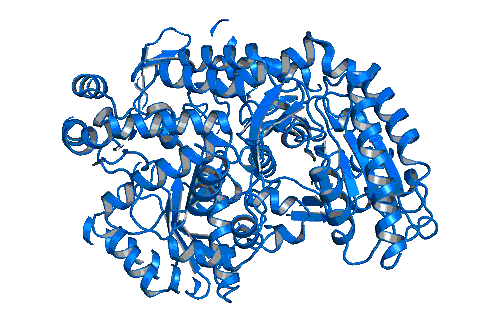Enzyme Technology
Enzyme technology is one of the corner stones of Industrial Biotechnology. The research in this area involves both fundamental and applied enzymology, biocatalysis, molecular modelling, structural biology and diagnostics.
The overall goal is to develop new and more sustainable products, processes and services to meet the human needs or to improve processes to produce existing products from new raw materials and biomass.

Research
Biocatalysis for sustainable chemistry
High-value chemicals consist of advanced molecules with precise three-dimensional geometry and shape. Synthesis of such compounds requires efficient methodology in few steps to be economically and environmentally feasible. Enzymes can be tailor made, combined and used as powerful machineries for this purpose. We are studying how to engineer and optimize enzymes for industrial-scale production of chemicals and we are also studying ways to mimic Nature and alter the catalytic machinery so that new chemical reactions can be performed in these new enzymes’ active site. This catalytic promiscuity is known to be the starting points of divergent evolution in Nature.
Contact
DNA diagnostics
The development of new DNA analysis technologies has fundamentally altered genomic research and allowed investigators to conduct experiments that were previously not technically feasible or affordable. Examples of important application areas are genomic analysis, epigenetic methylation analysis, drug resistance/response analysis and forensic science. Further improvements in technology robustness and process streamlining will pave the path for translation into molecular and clinical diagnostics. Our research will focus on development of a new principle for DNA analysis. By combining technologies based on reactions catalysed by enzymes the new principle will be developed with cancer research in particularfocus.
Contact
Biocatalysis towards bio-based polymers
For a sustainable future there is a call to increase the market share of bio-based polymers and materials. Selective enzyme catalysis has opened up new possibilities to obtain desired products. Our research focuses on basic and applied enzyme catalysis in combination with enzyme engineering. We are developing enzyme-based strategies aiming for selective and efficient routes towards functional bio-based polymers. With enzyme engineering we are developing enzymes for improved catalytic performance towards selected monomers. In collaboration with polymer chemists (BioPol-group KTH) we combine enzyme chemistries with chemical curing and formulation procedures aiming for powerful chemo-enzymatic routes towards tailored (i.e. durable) bio-based polymers and materials.
Contact
Structural Glycobiology
Structural biochemistry in combination with protein engineering is a powerful approach to understand how enzymes work and how they can be modified to perform better for specific biotechnological applications. Our research focuses on structure-function relationships underlying (1) enzymatic glycoconjugate and polysaccharide synthesis by integral transmembrane glycosyltransferases, and (2) the action of oxidative enzymes in biomass conversion (e.g., the cellobiose dehydrogenase–polysaccharide monooxygenase system, pyranose oxidases and dehydrogenases). We are also investigating systems for cell-free in-vitro production of sugar polymers for biomaterial design and therapeutics, and discovery of thermostable glycoside hydrolases for industrial applications.
Contact
Biomass Conversion
Innovative enzyme solutions can potentially improve efficient biomass utilization, and hence significantly contribute to the transition to a bio-based economy by offering environmentally friendly technologies for the production of biofuels, chemicals, and materials from biomass resources. Carbohydrate-active enzyme discovery from plant and microbial species via genomics, metagenomics and bioinformatics provide target enzymes for subsequent biochemical characterization. Current primary research focus is on enzymes belonging to glycoside hydrolase family 5 (GH5). The aim is to find enzymes that can be integrated into industrial processes converting biomass into valuable products.
Contact
Plant synthetic biology
The research aims at understanding how different types of transcription factor regulatory circuits regulate lignocellulose formation in plants. We use tools of plant molecular biology and bioinformatics analyses to infer lignocellulose-related regulatory circuits in different species. Based on these studies, we draw inspiration on natural networks to design synthetic transcription circuits aiming at increased and/or altered lignocellulose, in a synthetic biology type of approach. In the long term, our studies may allow us to manipulate biosynthesis of lignocellulose and of lignocellulose components (such as lignin, cellulose and/or xylan) for enhanced biomass production, saccharification potential and/or material properties.
Contact
